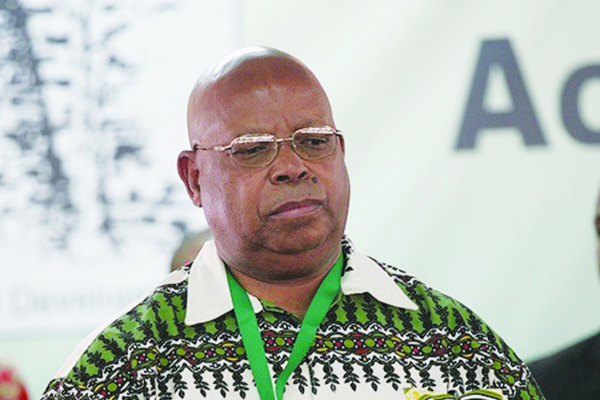
PARLIAMENT is now in the process of passing the 2018 National Budget, where MPs are expected to speak out and give suggestions as part of their oversight role to issues on how Finance minister Patrick Chinamasa can grow the budget cake through domestic resource mobilisation.
BY VENERANDA LANGA
Some suggestions on how to grow the national budget were recently proffered during the post-budget seminar for legislators in Harare by Speaker of the National Assembly Jacob Mudenda, who said there is need to urgently establish effective revenue collection systems such as the V-Code, which is a virtual revenue collection method.
“Government should urgently consider the establishment of virtual banking in tandem with virtual revenue collection from all sectors of the economy through a V-Code system,” Mudenda said.
“It is estimated that with this system, once installed for all our daily economic transactions, Treasury can realise between $7 billion to $10 billion annually in domestic financing,” he said.
The Speaker said use of such a system would kill Zimbabwe’s budget deficit, which is currently at $1,7 billion.
He said if such a system is in use, there will be no need to borrow externally, adding it would also give the country’s Sovereign Wealth Fund an immediate jump-start.
“Why miss such an opportunity when what is only required is an amendment to the Reserve Bank of Zimbabwe Banking Act or the promulgation of a statutory instrument allowing for the issuance of a V-Code banking licence,” he said.
- Chamisa under fire over US$120K donation
- Mavhunga puts DeMbare into Chibuku quarterfinals
- Pension funds bet on Cabora Bassa oilfields
- Councils defy govt fire tender directive
Keep Reading
MPs are also expected to scrutinise each budget vote thoroughly and refrain from rubber-stamping issues and passing the budget without any debate.
Among some of the ministry allocations, where robust debate is expected from MPs, is the budget allocation for the Health and Child Care ministry, which got the fourth biggest share of the budget at $408 million.
It translates to 7,7% of the total budget and is slightly up from 6,9% in the 2017 budget.
Although there is a slight improvement in the health allocation, the amount is still short of the 15% budget allocation to health as required by the Abuja Declaration which stipulates that at least 15% of the national budget must be allocated to health.
Mudenda pointed out his displeasure in the budget allocation to the Health ministry due to the deplorable state of health facilities, shortages of drugs, which are a contradiction to Section 76 of the Constitution of Zimbabwe which espouses the fundamental human right to health care.
“This situation is unacceptable and unattainable in our challenging health delivery service. This ministry should have the highest allocation at most or at least comply with the 15% benchmark set by the Abuja Declaration,” he said.
Community Working Group on Health executive director Itai Rusike in his 2018 post-budget analysis on the Health ministry vote said Zimbabwe will this year spend a measly $25 per person on health, while government expenditure on health continues to fail to reach the 11,3% of the national budget sub-Saharan Africa’s average.
World Health Organisation statistics show that the amount of $25 that government will spend on each person this year is actually a drastic drop from $62 per capita in 2013, which government spent per person, and $58 per capita in 2014, as well as $48 per capita in 2011.
The figures show that health allocations per capita in Zimbabwe have been seriously dwindling in the past years.
The Health and Child Care Parliamentary Portfolio Committee, chaired by Ruth Labode, has already indicated that it will make noise over the health allocation.
During a recent workshop on family planning, where MPs from the Health Committee learnt that in 2017 only $200 000 was allocated to family planning, Labode expressed displeasure saying it is not good for a country to rely on donors for family planning services, adding that Parliament will push that in the 2018 national budget, the Zimbabwe National Family Planning Council gets allocated 3% of the Health ministry budget to go towards family planning.
At the post-budget seminar for MPs, top government economist Ashok Chavrakarti overemphasised the important role of MPs in scrutinising the budget and legislators’ oversight role over ministries, state enterprises and parastatals, and local authorities in order to curb over expenditure.
Chavrakarti said the Finance ministry alone cannot be expected to monitor 22 government ministries, the 92 local authorities and 93 parastatals and State-owned enterprises without the help of Parliamentarians.
He pointed out issues of over expenditure have resulted in a budget deficit of $1,7 billion and Treasury Bills being issued out by government.
Although in 2017 the budget deficit is set to come down to $670 million, Chavrakarti said it is still too high and efforts must be made to bring it down further to at least $200 million.
“The impact to the economy is that high government expenditure and the budget deficit are the biggest cause of our structural problems resulting in printing of money, and real time gross settlement balances without real United States dollars, resulting in inflation,” Chavrakarti said.
The economist said there is need to reform the Zimbabwe Investment Authority Act (ZIA), adding that currently ZIA has no teeth.
To further grow the budget cake, Chavrakarti said there is need to tap into Diaspora remittances as the country has a big Diaspora of around three or four million Zimbabweans so that they invest in the country.
He said sectors such as industry, agriculture, mining and tourism must kick in order to spur economic growth.
Trade analyst Gift Mugano said it is important to have a thorough civil service audit because firing of 3 000 youth officers alone is not enough to cut the wage bill.
He said there is need to bring investor confidence by aligning laws to regional and international financial and investment protocols, because failure to align them will send wrong signals to investors.
Mugano said there is need for parastatal reforms, especially privatisation on non-service parastatals.
“For example, if we privatise Zesa Holdings we are in trouble, but companies like Cold Storage Company can be privatised,” he said.
Mugano said Zimbabwe needs to move with speed to ensure that all capable farmers regardless of the race can farm, as well as to unlock value in land tenure and to get rid of multiple farm ownership which results in idle land.











